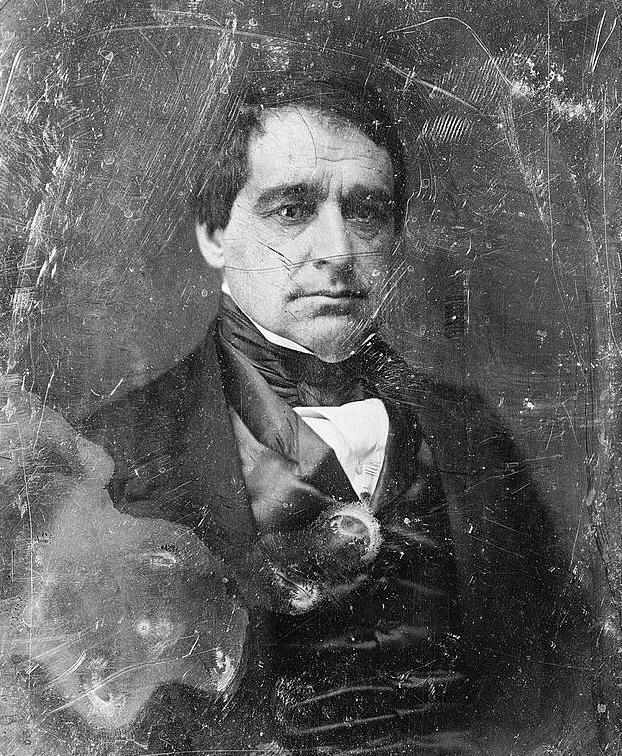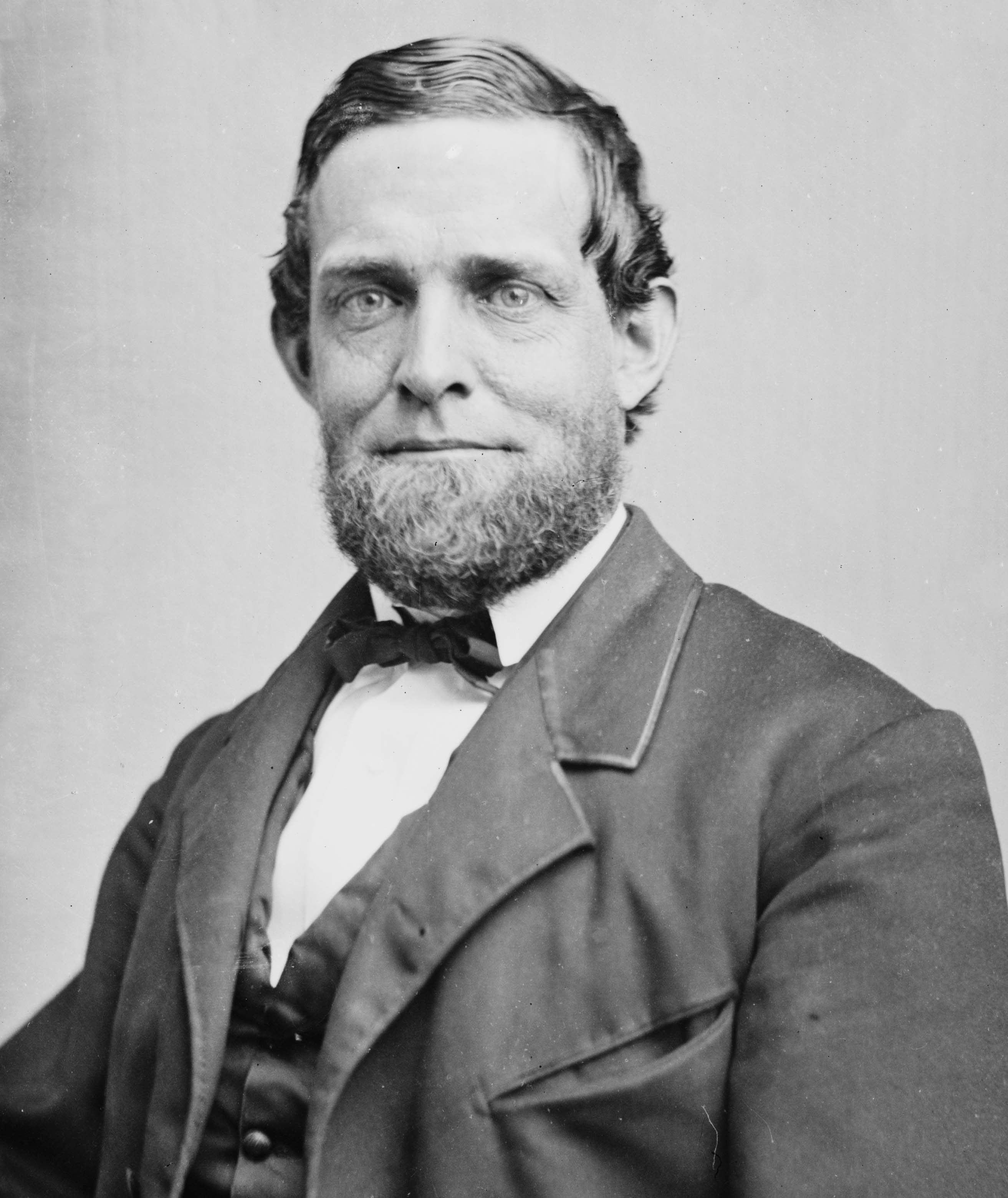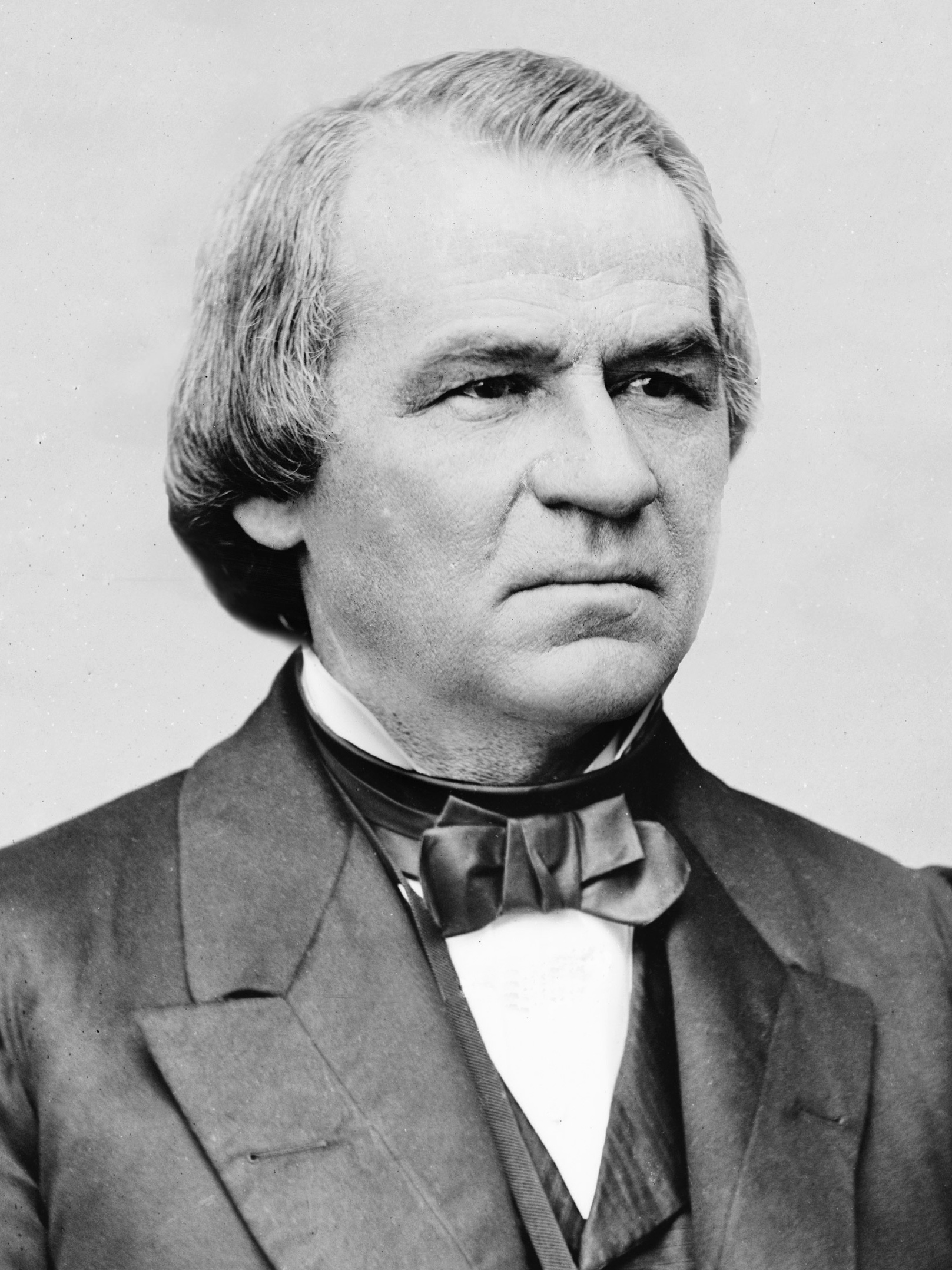|
Benjamin Eggleston
Benjamin Eggleston (January 3, 1816 – February 9, 1888) was a U.S. Representative from Ohio. Life and career Born in Corinth, New York, Eggleston completed preparatory studies. He moved with his parents to Hocking County, Ohio, in 1831. He moved to Cleveland and worked on a canal boat, later becoming an owner of boats and interested in several companies. He settled in Cincinnati in 1845 and engaged in mercantile pursuits. He was elected presiding officer of the city council of Cincinnati. He served as delegate to the Republican National Convention in 1860. Presidential elector for Lincoln/Hamlin in 1860. Smith 1898 : 124 He served as member of the Ohio Senate 1862–1865. Eggleston was elected as a Republican to the Thirty-ninth and Fortieth Congresses (March 4, 1865 – March 3, 1869). He was an unsuccessful candidate for reelection in 1868 to the Forty-first Congress. He again served in the Ohio Senate in 1880 and 1881. He resumed mercantile pursuits. He died ... [...More Info...] [...Related Items...] OR: [Wikipedia] [Google] [Baidu] |
Ohio
Ohio () is a state in the Midwestern region of the United States. Of the fifty U.S. states, it is the 34th-largest by area, and with a population of nearly 11.8 million, is the seventh-most populous and tenth-most densely populated. The state's capital and largest city is Columbus, with the Columbus metro area, Greater Cincinnati, and Greater Cleveland being the largest metropolitan areas. Ohio is bordered by Lake Erie to the north, Pennsylvania to the east, West Virginia to the southeast, Kentucky to the southwest, Indiana to the west, and Michigan to the northwest. Ohio is historically known as the "Buckeye State" after its Ohio buckeye trees, and Ohioans are also known as "Buckeyes". Its state flag is the only non-rectangular flag of all the U.S. states. Ohio takes its name from the Ohio River, which in turn originated from the Seneca word ''ohiːyo'', meaning "good river", "great river", or "large creek". The state arose from the lands west of the Appalachian Mountai ... [...More Info...] [...Related Items...] OR: [Wikipedia] [Google] [Baidu] |
Hannibal Hamlin
Hannibal Hamlin (August 27, 1809 – July 4, 1891) was an American attorney and politician who served as the 15th vice president of the United States from 1861 to 1865, during President Abraham Lincoln's first term. He was the first Republican vice president. An attorney by background, Hamlin began his political career as a Democrat in the Maine House of Representatives before being elected twice to the United States House of Representatives, and then to the United States Senate. With his strong abolitionist views, he left the Democratic Party for the newly formed Republican Party in 1856. In the 1860 general election, Hamlin balanced the successful Republican ticket as a New Englander partnering the Northwesterner Lincoln. Although not a close friend of the president, he lent loyal support to his key projects such as the Emancipation Proclamation. In the 1864 election, Hamlin was replaced as vice-presidential nominee by Andrew Johnson, a Southern Democrat chosen for his app ... [...More Info...] [...Related Items...] OR: [Wikipedia] [Google] [Baidu] |
Cincinnati City Council Members
Cincinnati ( ) is a city in the U.S. state of Ohio and the county seat of Hamilton County. Settled in 1788, the city is located at the northern side of the confluence of the Licking and Ohio rivers, the latter of which marks the state line with Kentucky. The city is the economic and cultural hub of the Cincinnati metropolitan area. With an estimated population of 2,256,884, it is Ohio's largest metropolitan area and the nation's 30th-largest, and with a city population of 309,317, Cincinnati is the third-largest city in Ohio and 64th in the United States. Throughout much of the 19th century, it was among the top 10 U.S. cities by population, surpassed only by New Orleans and the older, established settlements of the United States eastern seaboard, as well as being the sixth-most populous city from 1840 until 1860. As a rivertown crossroads at the junction of the North, South, East, and West, Cincinnati developed with fewer immigrants and less influence from Europe than Ea ... [...More Info...] [...Related Items...] OR: [Wikipedia] [Google] [Baidu] |
People From Corinth, New York
A person ( : people) is a being that has certain capacities or attributes such as reason, morality, consciousness or self-consciousness, and being a part of a culturally established form of social relations such as kinship, ownership of property, or legal responsibility. The defining features of personhood and, consequently, what makes a person count as a person, differ widely among cultures and contexts. In addition to the question of personhood, of what makes a being count as a person to begin with, there are further questions about personal identity and self: both about what makes any particular person that particular person instead of another, and about what makes a person at one time the same person as they were or will be at another time despite any intervening changes. The plural form "people" is often used to refer to an entire nation or ethnic group (as in "a people"), and this was the original meaning of the word; it subsequently acquired its use as a plural form of ... [...More Info...] [...Related Items...] OR: [Wikipedia] [Google] [Baidu] |
Burials At Spring Grove Cemetery
Burial, also known as interment or inhumation, is a method of final disposition whereby a dead body is placed into the ground, sometimes with objects. This is usually accomplished by excavating a pit or trench, placing the deceased and objects in it, and covering it over. A funeral is a ceremony that accompanies the final disposition. Humans have been burying their dead since shortly after the origin of the species. Burial is often seen as indicating respect for the dead. It has been used to prevent the odor of decay, to give family members closure and prevent them from witnessing the decomposition of their loved ones, and in many cultures it has been seen as a necessary step for the deceased to enter the afterlife or to give back to the cycle of life. Methods of burial may be heavily ritualized and can include natural burial (sometimes called "green burial"); embalming or mummification; and the use of containers for the dead, such as shrouds, coffins, grave liners, and ... [...More Info...] [...Related Items...] OR: [Wikipedia] [Google] [Baidu] |
Politicians From Cincinnati
A politician is a person active in party politics, or a person holding or seeking an elected office in government. Politicians propose, support, reject and create laws that govern the land and by an extension of its people. Broadly speaking, a politician can be anyone who seeks to achieve political power in a government. Identity Politicians are people who are politically active, especially in party politics. Political positions range from local governments to state governments to federal governments to international governments. All ''government leaders'' are considered politicians. Media and rhetoric Politicians are known for their rhetoric, as in speeches or campaign advertisements. They are especially known for using common themes that allow them to develop their political positions in terms familiar to the voters. Politicians of necessity become expert users of the media. Politicians in the 19th century made heavy use of newspapers, magazines, and pamphlets, as well ... [...More Info...] [...Related Items...] OR: [Wikipedia] [Google] [Baidu] |
Republican Party Members Of The United States House Of Representatives From Ohio
Republican can refer to: Political ideology * An advocate of a republic, a type of government that is not a monarchy or dictatorship, and is usually associated with the rule of law. ** Republicanism, the ideology in support of republics or against monarchy; the opposite of monarchism ***Republicanism in Australia ***Republicanism in Barbados ***Republicanism in Canada *** Republicanism in Ireland ***Republicanism in Morocco ***Republicanism in the Netherlands ***Republicanism in New Zealand ***Republicanism in Spain ***Republicanism in Sweden ***Republicanism in the United Kingdom ***Republicanism in the United States **Classical republicanism, republicanism as formulated in the Renaissance *A member of a Republican Party: **Republican Party (other) **Republican Party (United States), one of the two main parties in the U.S. **Fianna Fáil, a conservative political party in Ireland **The Republicans (France), the main centre-right political party in France **Republican Peop ... [...More Info...] [...Related Items...] OR: [Wikipedia] [Google] [Baidu] |
1888 Deaths
In Germany, 1888 is known as the Year of the Three Emperors. Currently, it is the year that, when written in Roman numerals, has the most digits (13). The next year that also has 13 digits is the year 2388. The record will be surpassed as late as 2888, which has 14 digits. Events January–March * January 3 – The 91-centimeter telescope at Lick Observatory in California is first used. * January 12 – The Schoolhouse Blizzard hits Dakota Territory, the states of Montana, Minnesota, Nebraska, Kansas, and Texas, leaving 235 dead, many of them children on their way home from school. * January 13 – The National Geographic Society is founded in Washington, D.C. * January 21 – The Amateur Athletic Union is founded by William Buckingham Curtis in the United States. * January 26 – The Lawn Tennis Association is founded in England. * February 6 – Gillis Bildt becomes Prime Minister of Sweden (1888–1889). * February 27 – In West O ... [...More Info...] [...Related Items...] OR: [Wikipedia] [Google] [Baidu] |
1816 Births
This year was known as the ''Year Without a Summer'', because of low temperatures in the Northern Hemisphere, possibly the result of the Mount Tambora volcanic eruption in Indonesia in 1815, causing severe global cooling, catastrophic in some locations. Events January–March * December 25 1815–January 6 – Tsar Alexander I of Russia signs an order, expelling the Jesuits from St. Petersburg and Moscow. * January 9 – Sir Humphry Davy's Davy lamp is first tested underground as a coal mining safety lamp, at Hebburn Colliery in northeast England. * January 17 – Fire nearly destroys the city of St. John's, Newfoundland. * February 10 – Friedrich Karl Ludwig, Duke of Schleswig-Holstein-Sonderburg-Beck, dies and is succeeded by Friedrich Wilhelm, his son and founder of the House of Glücksburg. * February 20 – Gioachino Rossini's opera buffa ''The Barber of Seville'' premières at the Teatro Argentina in Rome. * March 1 – The Gork ... [...More Info...] [...Related Items...] OR: [Wikipedia] [Google] [Baidu] |
41st United States Congress
The 41st United States Congress was a meeting of the legislative branch of the United States federal government, consisting of the United States Senate and the United States House of Representatives. It met in Washington, D.C. from March 4, 1869, to March 4, 1871, during the first two years of Ulysses S. Grant's presidency. The apportionment of seats in the House of Representatives was based on the Eighth Census of the United States in 1860. Both chambers had a Republican majority. Major events * March 4, 1869: Ulysses Grant became President of the United States * March 4, 1869: Carl Schurz R-Missouri became the first German American to serve in the United States Senate * May 10, 1869: Golden spike marked the completion of the First transcontinental railroad in Promontory, Utah * December 10, 1869: Wyoming Territory gave women the right to vote, one of the first such laws in the world * February 12, 1870: Utah Territory gave women the right to vote * February 25, 1870: Senat ... [...More Info...] [...Related Items...] OR: [Wikipedia] [Google] [Baidu] |
40th United States Congress
The 40th United States Congress was a meeting of the legislative branch of the United States federal government, consisting of the United States Senate and the United States House of Representatives. It met in Washington, D.C. from March 4, 1867, to March 4, 1869, during the third and fourth years of Andrew Johnson's presidency. The apportionment of seats in the House of Representatives was based on the Eighth Census of the United States in 1860. Both chambers had a Republican majority. In the Senate, the Republicans had the largest majority a party has ever held. Major events * March 30, 1867: Alaska Purchase * February 24, 1868: Impeachment of Andrew Johnson * May 16, 1868: President Johnson acquitted * May 26, 1868: President Johnson acquitted again * November 3, 1868: 1868 presidential election: Ulysses S. Grant (R) defeated Horatio Seymour (D) * December 25, 1868: President Johnson granted unconditional pardons to all Civil War rebels * January 20, 1869: Elizabet ... [...More Info...] [...Related Items...] OR: [Wikipedia] [Google] [Baidu] |
39th United States Congress
The 39th United States Congress was a meeting of the legislative branch of the United States federal government, consisting of the United States Senate and the United States House of Representatives. It met in Washington, D.C. from March 4, 1865, to March 4, 1867, during Abraham Lincoln's final month as president, and the first two years of the administration of his successor, U.S. President Andrew Johnson. The apportionment of seats in this House of Representatives was based on the Eighth Census of the United States in 1860. Both chambers had a Republican majority. Major events * March 4, 1865: Second inauguration of President Abraham Lincoln. * April 9, 1865: Surrender of Confederate forces at Appomattox Court House, effectively ending the American Civil War * April 15, 1865: Assassination of President Abraham Lincoln, Vice President Andrew Johnson became President of the United States * December 11, 1865: Creation of the House Appropriations Committee and the House Banki ... [...More Info...] [...Related Items...] OR: [Wikipedia] [Google] [Baidu] |


_1938.jpg)




